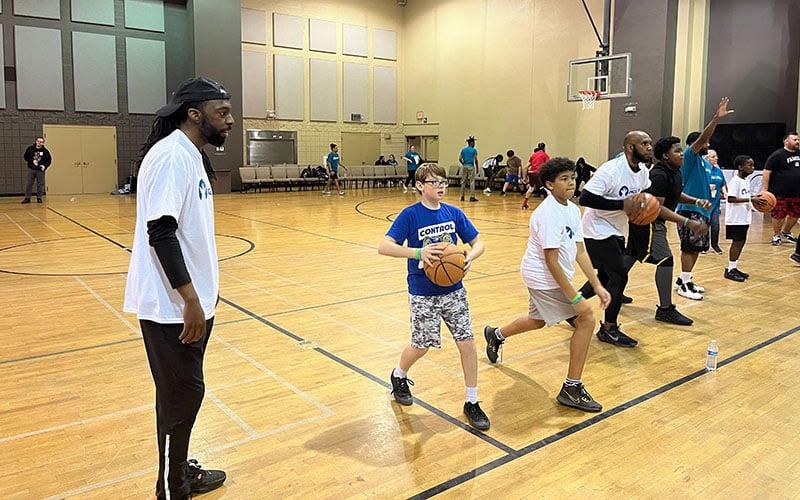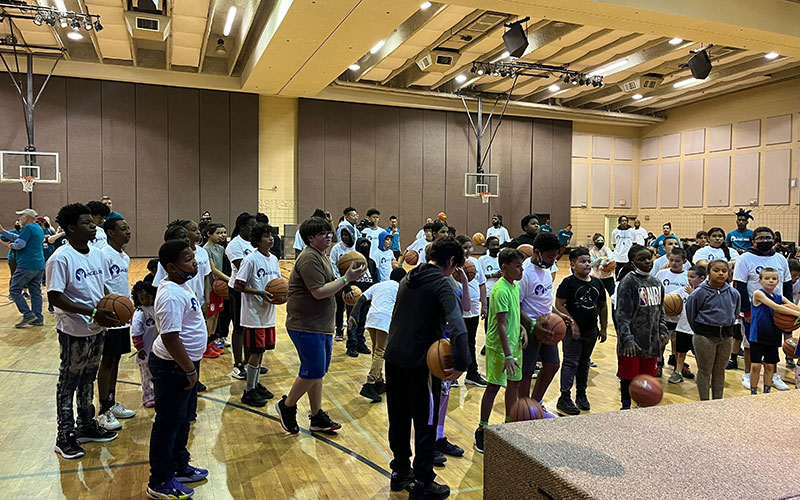
The recent Prison Fellowship Angel Tree Sports Camp at Arizona’s Central Christian Church in Mesa gave the children of incarcerated parents a place to share common interests and feel safe. (Photo by Dylan Rush/Cronkite News
MESA – A child with an incarcerated parent is about three times as likely to run into trouble with the law than other children, according to a study conducted by Central Connecticut State University, In the United States, 8% of children have had an incarcerated parent. In Arizona, that number is even higher at about 11%.
Those numbers are why Arizona’s Central Christian Church hosted the Prison Fellowship’s Angel Tree Sports Camp recently. Exclusive to children with incarcerated parents, the camp offered a day filled with activities and guidance for less fortunate youth in the Arizona community.
“We want to break this cycle of incarceration,” said Karen Lopez, director of Church Partnerships & Angel Tree Sports Camps, who organized the Mesa camp. “We try to drive that point home. Just because a parent, a loved one, or someone you know made some questionable choices, it doesn’t mean that you should do the same.”
The camp benefited more than 150 Arizona kids ranging in age from 7-17. Each camper was given a basketball, a Bible and a pair of sneakers – with a wide variety of sizes and styles from which to choose.
“I met a lot of people and learned a lot,” said Joshua, a 14-year-old camper. “I wish I could do this all the time. It was cool.”
While organizers were glad to see kids enjoying themselves, the day was about much more than playing basketball and hanging out with friends.
“It’s not just a day of having fun,” Lopez said. “This is about truly having long term impacts on these kids and their families. One of our primary goals is to show (the kids) that their own choices can shape the direction of their lives.”
Among those working the event was Central Christian’s Mesa campus pastor, Perry Emerick.
He gathered the campers and gave an inspiring speech about decision making and life choices before finishing with a prayer and sending the campers off to various basketball drills.
“I think it’s a big surprise to many, how many kids whose parents are incarcerated there are right here in our community,” Emerick said. “This camp was a great way to be a presence in their lives, help them and bless them in whatever way possible.”
The event included an appearance by Kenny Dobbs, billed as “The Best Slam Dunk Artist in the World,” and someone who narrowly avoided his own prison sentence as a young man.
Dobbs taught campers some basketball fundamentals then put on a dunking exhibition.
However, while Dobbs may specialize in dunking basketballs, he recognizes that isn’t the true significance of the camp.
“The whole purpose of today’s mission is to use basketball as a vehicle to be able to impact these kids’ lives,” Dobbs said. “Like they say, it takes a village to raise children. We’re out here today as one village, one community, impacting these kids, man. That’s what it’s all about.”
About 70% of children in America are raised in households with two parents, so many of them don’t need a village. But the children of incarcerated parents often do.
The Prison Fellowship was founded in 1976 by a notorious figure in the history of U.S. politics, Charles Colson, who was a special advisor to former President Richard Nixon. Colson was sentenced to federal prison for obstruction of justice during the Watergate Scandal.
After he was released, Colson decided to commit his life to creating a more restorative approach to the criminal justice system.
Colson’s fellowship seeks to transform the lives of prisoners, care for their families and advocate for a justice system that works to help individuals change their ways. The program is funded almost exclusively by charitable donations, with contributions exceeding $60 million in the last calendar year, according to the Prison Fellowship.
In addition to hosting camps for the children, members of the organization travel to prisons across the country to evaluate who they might help and in what ways. While they urge prisoners to sign their children up for the Angel Tree Sports Camps, the fellowship also provides the families of prisoners with Christmas gifts.
Rather than placing the address of the organization on the gifts, the fellowship addresses the gifts from the incarcerated parent, reminding kids that their mom or dad is still part of their lives. It’s a subtle but important detail.

A study conducted by Central Connecticut State University revealed that nearly 11 percent of children in Arizona have had an incarcerated parent. (Photo by Dylan Rush/Cronkite News)
“We try to touch these kids’ lives throughout the year, but it all starts at Christmas. It’s one of my favorite things we do here,” Lopez said.
Central Christian Church’s David Prian was a beneficiary of this wholesome method of support and holds a special relationship with the Prison Fellowship.
Before becoming a member of the church, joining their marketing team and volunteering for the ACTS Homeless Ministry, Prian was arrested for trafficking stolen vehicles.
Shortly after he was sentenced, his first son was born. The fellowship paid Prian a visit at Florence Prison, explaining how their program could be of service to him and his family.
“When you’re locked up, the holidays are always the hardest,” Prian said. “On Christmas, because of this incredible organization, my son was able to get gifts from his dad. It allowed me to be part of Christmas with my family, which meant a lot to us.”
One of Prian’s biggest challenges while incarcerated was being away from his wife and son. He felt like he was being left behind.
Once he came in contact with the fellowship, that all began to change.
“It felt like I was still valued – like I mattered,” Prian said. “It showed me that there were some people out there that not only cared about myself, but about my family too.”
Since his release in 2011, Prian has turned his life around. He graduated from DeVry University at the top of his class upon his reentry into society, finishing with a 4.0 GPA and receiving summa cum laude honors. He now owns and runs a digital marketing agency, and has multiple cars and trucks.
On Saturday, Prian helped facilitate the Prison Fellowship’s Angel Tree Sports Camp at his church, lending a hand to the organization that helped him change his life all those years ago. He was grateful to be in a position where he could help to guide children and parents in situations similar to his own in the past.

